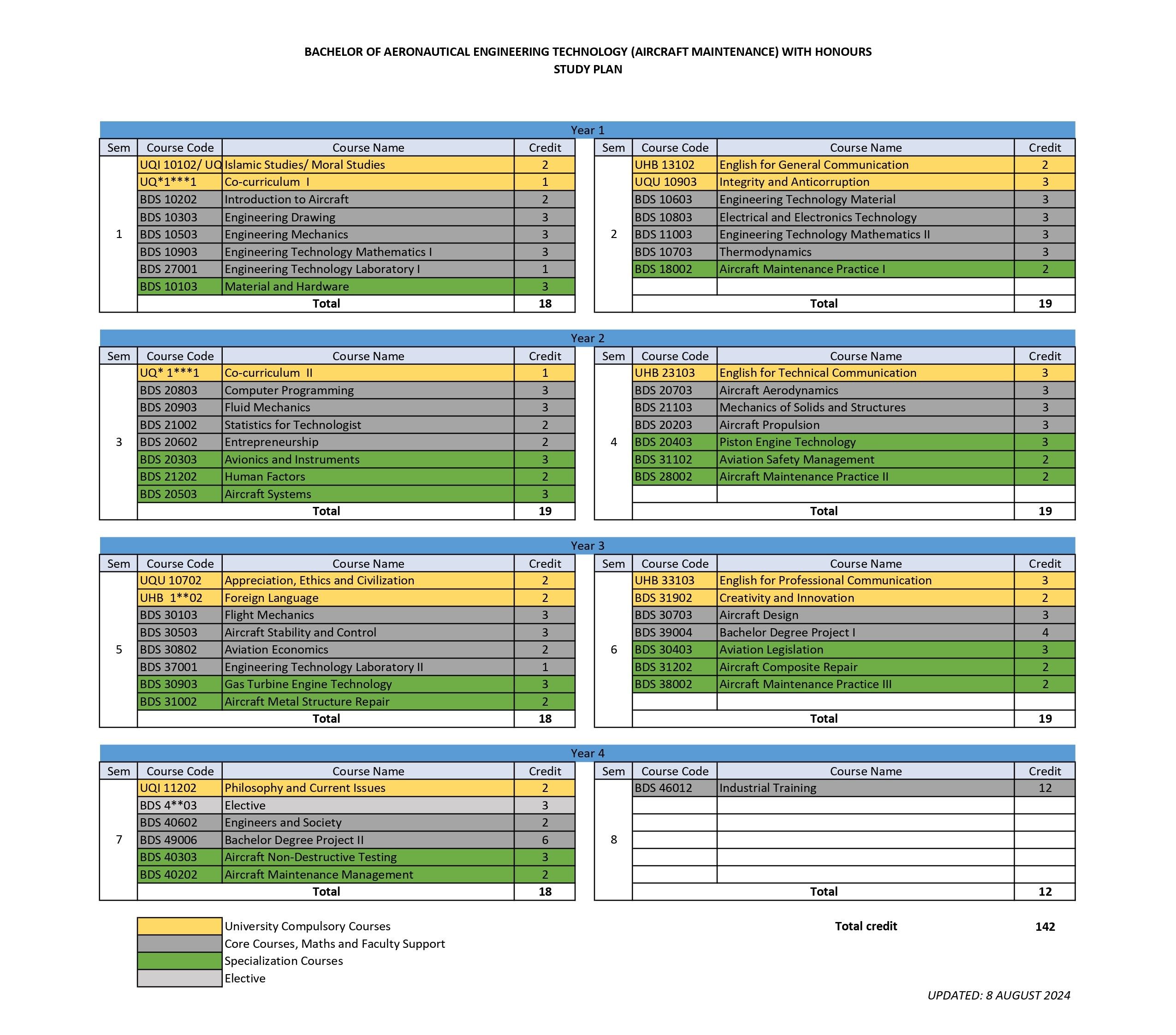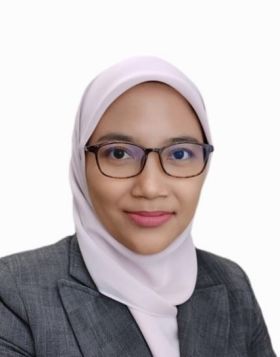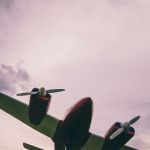Bachelor of Aeronautical Engineering Technology
(Aircraft Maintenance) with Honours [BDM]
(Aircraft Maintenance) with Honours [BDM]
MQA Accreditation: MQA/FA8276
Overview
The Bachelor of Aeronautical Engineering Technology (Aircraft Maintenance)programme is designed to equip students with the essential knowledge and skills required for future roles as technologists in the aviation industry. This comprehensive program seamlessly integrates theoretical learning with practical, hands-on experience, ensuring graduates are well-prepared to meet the evolving demands of the aviation sector.
The program adopts the Outcome Based Education (OBE) philosophy, ensuring that graduates are equipped with robust engineering knowledge and possess strong individual soft skills. This holistic approach prepares students for successful careers in aviation.
Students will specialise in aircraft maintenance, gain insights into the latest technologies and engage in extensive laboratory work and practical training. The knowledge and hands-on experience cover various aspects of aircraft systems and maintenance practices.
The program provides a pathway for students to pursue relevant professional certifications upon graduation, such as the CAAM Part 66 Aircraft Maintenance License. This enhances their employability and career prospects in the aviation industry.
Graduates of this program are well-prepared to pursue diverse career opportunities within the aviation industry, including roles in airlines, MRO organisations, CAMOs, maintenance training organisations, and aviation safety regulatory authorities. The program also lays a solid foundation for those aiming to further their studies or obtain specialised certifications, paving the way for a diverse and successful career.
ENTRY REQUIREMENTS
MATRICULATION/FOUNDATION
GENERAL REQUIREMENTS
- Pass the Sijil Pelajaran Malaysia (SPM) with a distinction in Bahasa Melayu/Bahasa Malaysia and a pass in Sejarah, and
- Pass Matriculation/Foundation of Science with at least CGPA 2.00, and
- Achieve a minimum Band 2 in MUET.
SPECIAL REQUIREMENTS
- Pass Matriculation/Foundation and obtain at least Grade C (2.00) in Mathematics and Physics/Engineering Physics, and
- Obtain at least Grade C (2.00) in one of the following subjects:
• Chemistry/Engineering Chemistry
• Civil Engineering/Civil Engineering Technology
• Mechanical Engineering/Mechanical Engineering Technology
• Electrical and Electronic Engineering/ Electrical and Electronic Engineering Technology
• Basic Engineering/Basic of Engineering Technology
• Biology
• Computer Science/Computing/Programming
OR
- Pass Matriculation/Foundation and obtain at least Grade C (2.00) in Mathematics and Chemistry/Engineering Chemistry, and
- Obtain at least Grade C (2.00) in one of the following subjects:
• Civil Engineering/Civil Engineering Technology
• Mechanical Engineering/Mechanical Engineering Technology
• Electrical and Electronic Engineering/ Electrical and Electronic Engineering Technology
• Basic Engineering/Basic of Engineering Technology
• Biology
• Computer Science/Computing/Programming
and - Obtain at least Grade C in Physics during SPM.
AND
No disabilities that hinder the ability to learn or perform experimental and practical tasks.
DIPLOMA/EQUIVALENT
GENERAL REQUIREMENTS
- Pass the Sijil Pelajaran Malaysia (SPM) with a distinction in Bahasa Melayu/Bahasa Malaysia and a pass in Sejarah, and
- Obtain a diploma from a public university or polytechnic, or any other qualification recognised by the Government of Malaysia, and
- Achieve a minimum Band 2 in MUET.
SPECIAL REQUIREMENTS
Obtain a Diploma in Engineering or Engineering Technology, or any equivalent qualification recognized by the Government of Malaysia with at least CGPA 2.50; or
Pass APEL A Level 6
AND
No disabilities that hinder the ability to learn or perform experimental and practical tasks.
For more information about the entry requirements, click here
Programme Educational Objective (PEO) & Programme Learning Outcome (PLO)
PROGRAMME EDUCATIONAL OBJECTIVE (PEO)
PEO1: Excel in various engineering practices in aerospace/ aviation industries.
PEO2: Hold management or decision-making position.
PEO3: Capable to lead business and technopreneurs activities in accordance with national needs and demands
PEO4: Have a strong commitment to lifelong learning and continuous professional development.
PROGRAMME LEARNING OUTCOME (PLO)
PLO1: Comprehend and able to apply the science, mathematics, engineering and aeronautical technology in the field of aircraft maintenance.
PLO2: Capable of identifying problems, formulating and finding solutions to problems in designing or assessing flight operation performance using systematic approach.
PLO3: Design solutions for broadly defined engineering technology problems and contribute to the design of systems, components or processes to meet specified needs with appropriate consideration for public health and safety, cultural, societal, and environmental considerations.
PLO4: Conduct investigations of broadly defined problems; locate, search and select relevant data from codes, data bases and literature, design and conduct experiments to provide valid conclusions.
PLO5: Select and apply appropriate techniques, resources, and modern engineering and IT tools, including prediction and modelling, to broadly defined engineering activities, with an understanding of the limitations.
PLO6: Demonstrate understanding of the societal, health, safety, legal and cultural issues and the consequent responsibilities relevant to engineering technology practice.
PLO7: Understand the impact of engineering technology solutions in societal and environmental context and demonstrate knowledge of and need for sustainable development.
PLO8: Understand the responsibility and ethics of being an engineering technologist in the aspects of safety, social, culture and global and the necessity for sustainable development.
PLO9: Act effectively as individual and in a team.
PLO10: Communicate effectively with professionals and non-professionals.
PLO11: Demonstrate knowledge and understanding of engineering management principles and apply these to one’s own work, as a member and leader in a team and to manage projects in multidisciplinary environments.
PLO12: Possess awareness and commitment for lifelong learning.
Curriculum

Ask Us
If you require any further information, please contact us.

Ts. Dr. Siti Nur Mariani Binti Mohd Yunos
Head of Programme
Bachelor of Aeronautical Engineering Technology (Aircraft Maintenance) with Honours (BDM)
Department of Aeronautical Engineering
Faculty of Mechanical and Manufacturing Engineering
Email: nmariani @uthm.edu.my

Ilmu itu dimiliki oleh lidah yang banyak bertanya, dan akal yang gemar berfikir
